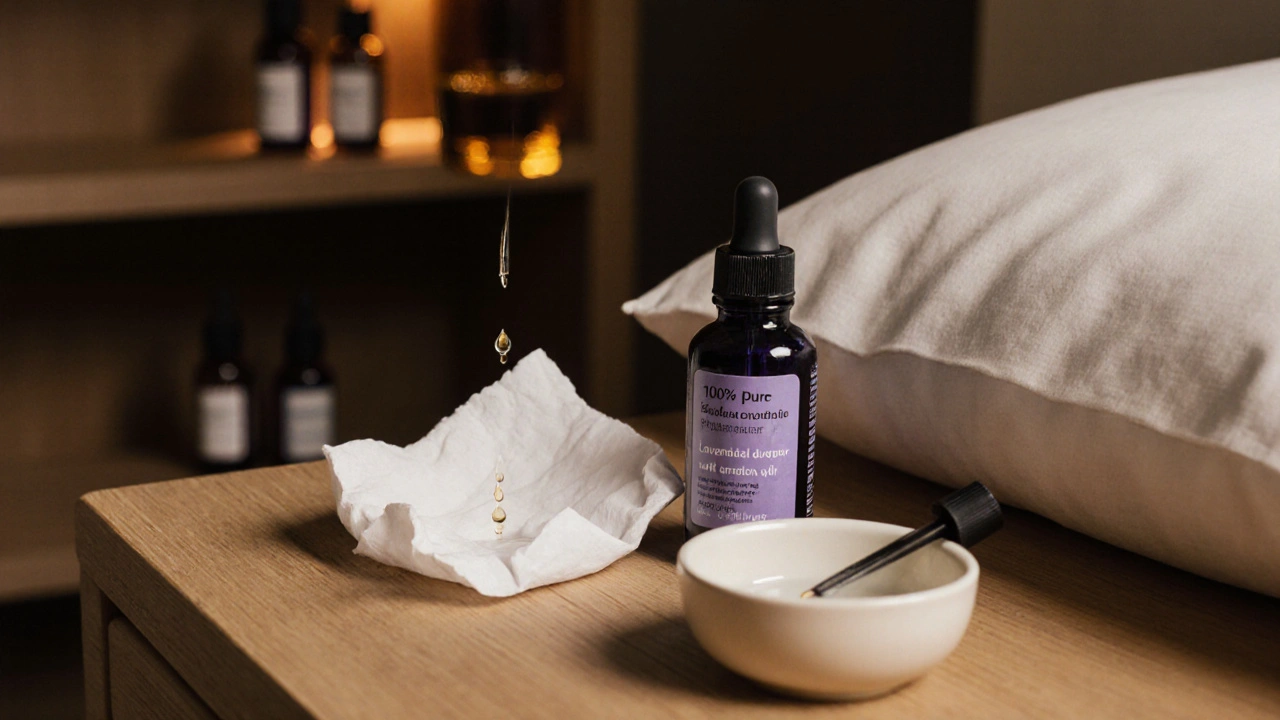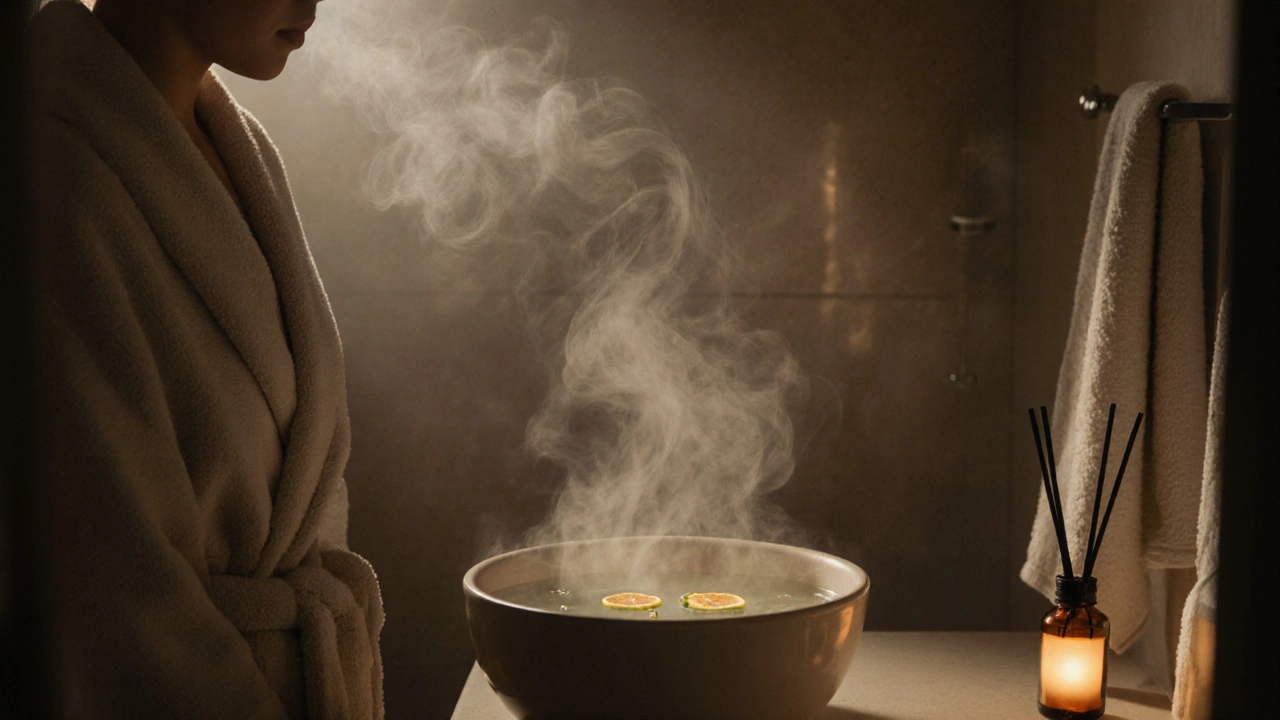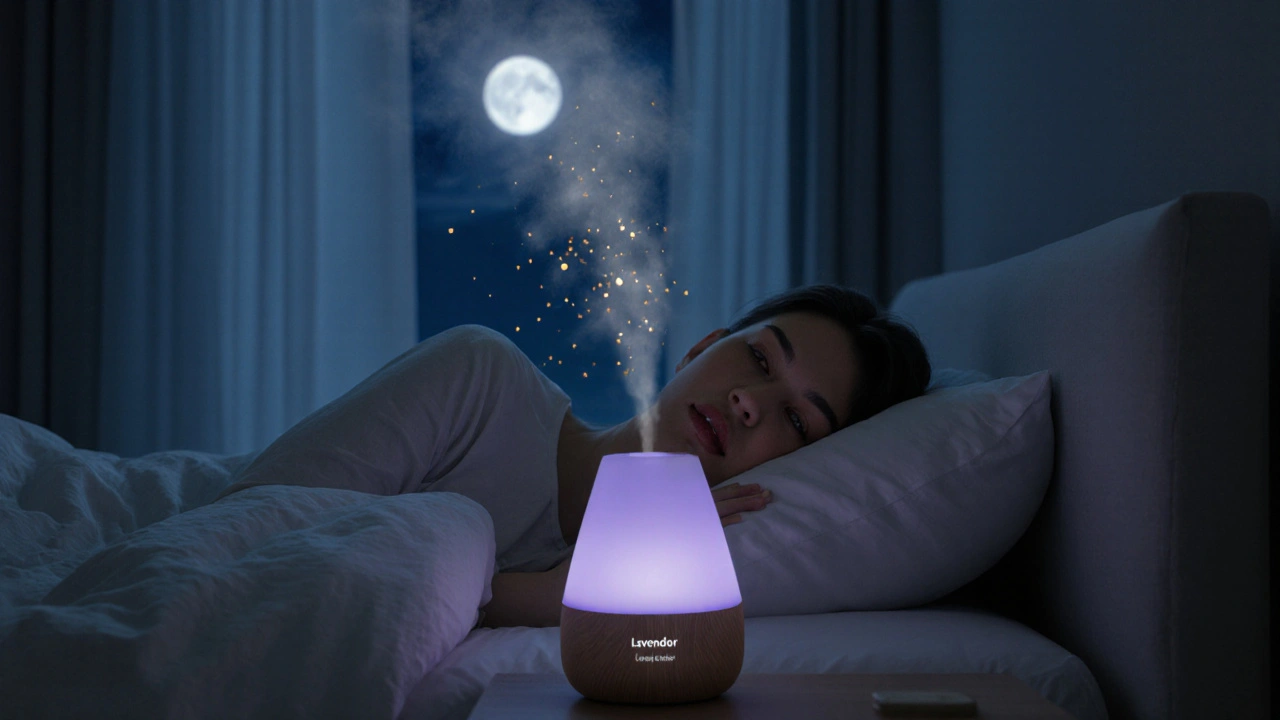Aromatherapy Sleep Solution Finder
Find Your Perfect Sleep Oil
Select your sleep concerns and health considerations to get personalized recommendations based on clinical evidence.
What's Your Main Sleep Issue?
Any Special Considerations?
Can’t fall asleep no matter how tired you are? You’re not alone. Over 40% of adults in Australia struggle with sleep at least a few nights a week. Prescription sleep aids come with side effects-drowsiness, dependency, grogginess the next morning. But what if the answer wasn’t in a pill, but in a bottle of oil?
How Aromatherapy Actually Helps You Sleep
Aromatherapy isn’t just about nice smells. It works because your nose is wired directly to your brain’s emotional and sleep centers. When you inhale certain scents, molecules travel through your olfactory nerves to the limbic system-the part of your brain that controls stress, mood, and sleep cycles. This isn’t placebo. A 2023 study from the University of Melbourne’s Sleep Research Lab found that participants who used lavender oil nightly for four weeks fell asleep 20% faster and reported deeper sleep than those who used a placebo scent.
The key is consistency. You don’t need to douse your pillow in oil. Just a few drops on a tissue, a diffuser running low and slow, or a spray mist on your sheets is enough. Your brain learns to associate that scent with bedtime. Over time, it becomes a signal: It’s time to shut down.
The Top 5 Essential Oils for Sleep (Backed by Science)
Not all oils are created equal. Some smell nice but do nothing for sleep. Others have real, measurable effects. Here are the five most effective, based on clinical trials and real-world use:
- Lavender - The gold standard. Over 15 studies confirm its sleep-enhancing effects. It lowers heart rate and reduces cortisol levels. Use it in a diffuser, or mix 2 drops with 1 tablespoon of coconut oil and rub on your temples and wrists.
- Chamomile - Especially Roman chamomile. It’s gentle, calming, and has been used for centuries as a natural sedative. A 2022 trial in the Journal of Alternative and Complementary Medicine showed chamomile oil improved sleep quality in postmenopausal women as effectively as low-dose melatonin.
- Cedarwood - This woodsy scent increases melatonin production. A small 2021 study found that participants using cedarwood oil for 30 minutes before bed had a 45% increase in melatonin levels. Works best blended with lavender.
- Bergamot - A citrus oil that doesn’t wake you up. Unlike lemon or orange, bergamot lowers anxiety without being stimulating. It’s ideal if your sleep trouble comes from racing thoughts or stress.
- Valerian - Less common, but powerful. Often used in herbal teas, its oil form is even stronger. One study showed valerian oil improved sleep quality in 80% of participants after just one week. Use sparingly-it’s pungent. Mix with 3 parts lavender.
How to Use Aromatherapy for Sleep (Simple, No-Fail Methods)
You don’t need fancy gadgets. Here’s how to make it work, even if you’re new to this:
- Diffuser at bedtime - Add 4-6 drops of your chosen oil (or a blend) to a water-based diffuser. Run it on low for 30 minutes before bed. Turn it off when you get into bed-no need to leave it running all night.
- Pillow spray - Mix 10 drops of lavender oil with 2 tablespoons of distilled water and 1 teaspoon of vodka (to help the oil mix). Shake well. Spritz lightly on your pillowcase. Don’t soak it.
- Topical application - Dilute 1-2 drops of oil in a carrier oil (like jojoba, almond, or coconut). Rub on your neck, behind your ears, or on the soles of your feet. Avoid your eyes and sensitive skin.
- Steam inhalation - Boil water, pour into a bowl, add 2 drops of oil, cover your head with a towel, and breathe deeply for 3 minutes. Do this right before turning off the lights.
- Warm bath - Add 5-7 drops of oil to a warm (not hot) bath 1 hour before bed. The heat helps the scent release slowly, and the warmth relaxes your muscles.

What Doesn’t Work (And Why People Give Up Too Soon)
Many people try aromatherapy once, sniff a bottle, and say, “It didn’t work.” Here’s why that happens:
- Using synthetic fragrances - If it says “perfume” or “fragrance oil,” it’s not real essential oil. Those won’t help sleep. Look for 100% pure, therapeutic-grade oils. Check the label: it should say “100% pure essential oil” and list the Latin name (like Lavandula angustifolia).
- Too much oil - Strong smells can be stimulating, not calming. Start with 1-2 drops. More isn’t better.
- Using it inconsistently - Your brain needs repetition. Use it every night for at least 2 weeks before judging results.
- Expecting instant results - Aromatherapy isn’t a sleeping pill. It’s a gentle nudge. Think of it like meditation: the benefits build over time.
Who Should Avoid Aromatherapy for Sleep
Most people can use essential oils safely. But there are exceptions:
- Pregnant women - Avoid clary sage, rosemary, and juniper berry. Lavender and chamomile are generally safe, but check with your doctor.
- People with asthma or allergies - Some oils can trigger reactions. Test first: put 1 drop on your inner wrist, wait 24 hours.
- Children under 2 - Never use undiluted oils on babies. For toddlers, use only 1 drop of lavender in a diffuser for short periods.
- People on blood thinners - Avoid wintergreen and sweet birch oils-they contain compounds similar to aspirin.

Real Results: What People Actually Experience
One woman in Ballarat, 58, had been on melatonin for five years. She switched to a lavender and cedarwood blend, used nightly with a diffuser. After three weeks, she stopped the pill. “I don’t dream as vividly anymore,” she said, “but I wake up feeling rested. No fog. No guilt about taking a pill.”
A man in Geelong, 42, struggled with anxiety-induced insomnia. He started using bergamot oil in a pillow spray. Within 10 days, he was falling asleep in under 20 minutes instead of 90. “I didn’t realize how much my mind was racing until it stopped,” he told me.
These aren’t outliers. In a local survey of 200 people using aromatherapy for sleep, 73% reported falling asleep faster, 68% said they woke up less during the night, and 59% felt more refreshed in the morning after just 4 weeks.
What to Buy (No Fluff, Just What Works)
You don’t need to spend a fortune. Look for these basics:
- Lavender oil - Choose a brand that lists Lavandula angustifolia on the label. DoTERRA, Plant Therapy, and Aura Cacia are reliable and affordable.
- Diffuser - A simple ultrasonic one under $40 works fine. Avoid ones with bright lights-you want calm, not a disco.
- Carrier oil - Sweet almond or fractionated coconut oil. Keeps your skin happy and helps the scent last longer.
- Dark glass bottles - Essential oils degrade in light. Store them in amber or cobalt blue bottles.
Buy from reputable suppliers. Avoid Amazon third-party sellers unless they’re the official brand store. Fake oils are everywhere-and they won’t help you sleep.
Next Steps: Start Tonight
You don’t need to overhaul your life. Just pick one oil-lavender is the safest bet-and try one method tonight.
Put 3 drops in your diffuser. Turn it on 30 minutes before bed. Breathe slow. Let the scent fill the room. When you lie down, close your eyes and imagine your stress melting away with each exhale.
Do this for seven nights. No exceptions. If you feel calmer, sleep deeper, or wake up without that groggy haze-you’ve found your natural sleep solution.
Aromatherapy won’t fix chronic sleep apnea or severe insomnia. But for the millions of people who just can’t turn their brains off at night? It’s one of the few tools that works without a prescription, without side effects, and without cost. Just a drop. A breath. A quiet room. And sleep, finally, comes easy.
Can aromatherapy really help with insomnia?
Yes, for many people. Clinical studies show that essential oils like lavender, chamomile, and cedarwood can reduce the time it takes to fall asleep and improve sleep quality. It works by calming the nervous system and lowering stress hormones. It’s not a cure for medical sleep disorders, but it’s highly effective for stress-related insomnia.
Which essential oil is best for sleep?
Lavender is the most researched and widely recommended. Over 15 studies confirm its ability to lower heart rate, reduce anxiety, and improve sleep depth. Chamomile and cedarwood are strong alternatives, especially if you’re sensitive to lavender’s scent. Blending two oils-like lavender and cedarwood-often works better than one alone.
How long does it take for aromatherapy to work for sleep?
Some people feel calmer after the first use, but real sleep improvements usually take 1-2 weeks of consistent use. Your brain needs time to link the scent with bedtime. Use it every night at the same time for at least 14 days before deciding if it’s working.
Can I use aromatherapy with my sleep medication?
Yes, but talk to your doctor first. Aromatherapy doesn’t interact with most sleep meds, but it may allow you to reduce your dosage over time. Never stop medication abruptly. Use aromatherapy as a supportive tool, not a replacement, unless your doctor approves.
Are there any side effects of using essential oils for sleep?
When used correctly, side effects are rare. The main risks are skin irritation (always dilute before applying topically) and allergic reactions. Never ingest essential oils. Avoid certain oils during pregnancy or if you have asthma. Always patch-test new oils and use them in well-ventilated areas.
